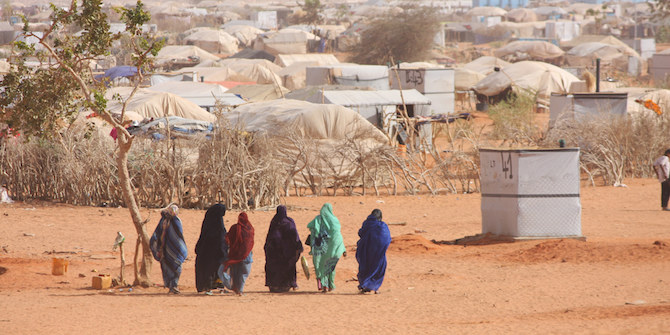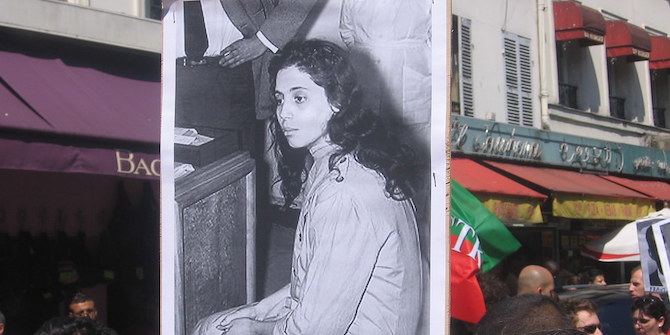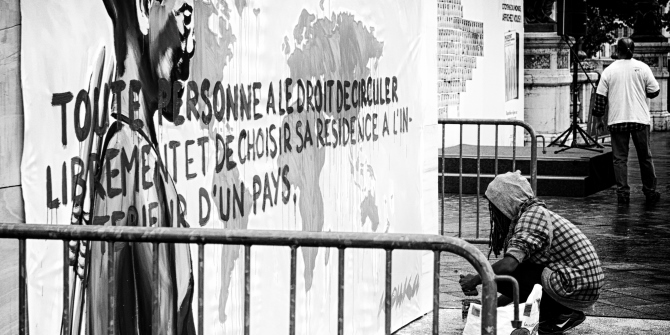by Olga Martín González
This article is part of a 7-part series assessing the prospects and challenges for the study of North Africa in the wake of the Arab Spring.

My research focused on gender based violence and the impact of fragility and conflict on women’s and girls’ rights in eastern Mauritania, comparing the situation of Malian refugees living in Mbera Camp with the situation of women and girls outside the camp. Both have much in common and are potentially in competition for resources as they struggle for survival, and both experience forms of Gender Based Violence (GBV).
In order to respond to these needs, in 2014 a project focusing on GBV in Mbera Camp, ‘Prevention and Response to Gender-based Violence in host Communities and Refugees in Hodh El Chargui’, was launched, funded by the Spanish Agency of International Co-operation for Development (AECID) through UNICEF until 2016. The forms of GBV most prevalent in Mbera Camp and in local communities outside were: child forced marriage, sexual harassment, female genital mutilation (FGM), rape and physical assault. The main project activities were: raising awareness of GBV, identification of protection cases and case management, including psychological support, counselling, income-generating activities and provision of non-food items.
Women and girls perceived that they face the same types of GBV in Mbera as they had back in Mali, mainly, child forced marriage and rape. Child forced marriage is considered to be a ‘protection marriage’, protecting young girls from premarital sex, pregnancy outside marriage, sexual assault and rape, but in reality it compromises a girl’s future by resulting in early pregnancy, interrupting her schooling and placing her at increased risk of domestic violence. Rape is often unreported due to mistrust of the police given that perpetrators are normally not arrested, and additionally women who have been attacked fear the reaction of their family and the community that may marginalise, reject and stigmatise the victim. FGM is not practised by the Touareg communities, while Arabs interviewed said that some people abandoned the practice after they were sensitised by NGOs working in the camp, and others said the practice did currently exist. Domestic violence is not perceived as a problem in many cases.
Outside the camp, women and girls from the host communities that received some awareness-raising sessions on GBV affirmed that forced marriages and FGM were no longer performed, with communities now aware of the negative consequences for the health of the girls. Contrary to what the women said, men admitted that forced marriage and FGM continue to take place in the village. Most of the women in the village said that they married very young and they had to abandon school. Regarding other forms of violence, women and girls echoed the views of women from Mbera Camp regarding rape.
There are many lessons to be taken from this experience, and the challenges are too numerous to cover. In the context of the Arab Spring, Mauritania was left relatively unchanged and there was barely any impact on parts of the country far removed from the capital, as in the Mbera camp or outside. The research aimed to contribute to debates on integrating a gender perspective into humanitarian and development programming in a coherent manner that meets the needs of both refugee and non-refugee ‘host’ communities in an area, to work more strategically and build sustainable and peaceful solutions. In order to respond fully to GBV, humanitarian organisations and donors need to support transformative changes to social norms as well as respond to basic needs and meet longer-term needs of both refugees and ‘host’ communities. Area-based solutions to GBV in a context like Mbera need to ensure that all women and girls facing forms of GBV are able to access services and protection. Appropriate response packages for victims and survivors of GBV should be developed and an effective referral system should be put in place. The importance of education and access to economic opportunities as a basis for the empowerment of women and girls and to overcome traditional attitudes that perpetuate discrimination and violence should also be strengthened.
Olga Martín González, formerly of the Spanish Agency for International Development Cooperation, is is a Project Humanitarian Officer for the Sahel Region based in Senegal. This is an edited portion of a longer paper, available to read online. Olga can be reached at olgainesmartin@gmail.com
In this series:
- The Arab Spring and the Academy: Studying North Africa in the Wake of the Protest by Jonathan Hill
- An Uprising in the Social Sciences? The Study of Middle East Politics in Transformation by Florian Kohstall
- Studying Libya today: Exploring the past to understand the present and shape future research agendas by Anna Baldinetti
- The Politics-Security Nexus in Post-Revolutionary Tunisia by Francesco Milan
- Algeria: Changing behind a Façade of Stalemate by Rasmus Alenius Boserup
- Revisiting the Cultural Field in Morocco and Tunisia after the ‘Arab Spring’ by Cristina Moreno Almeida






